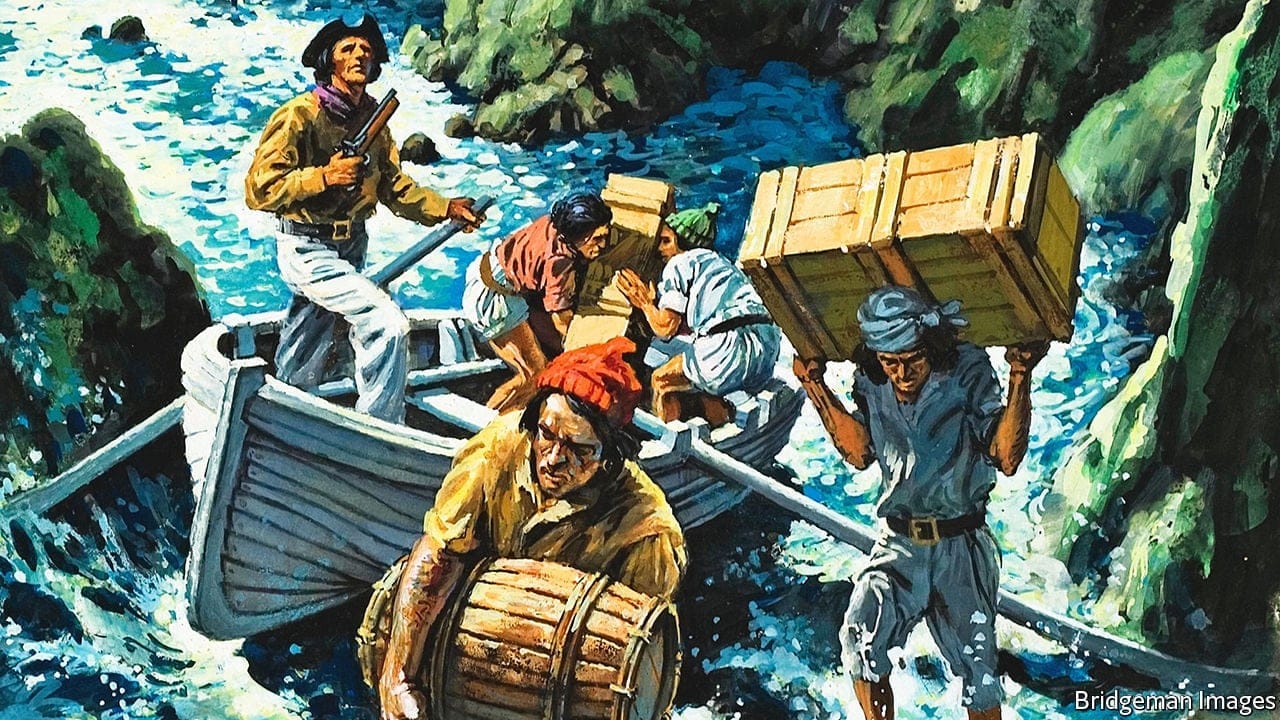If smuggling isn’t the world’s oldest profession, it’s likely a smuggler was one of its first customers. The moment a tax or restriction is imposed on any trade, an incentive for smuggling is created.
Smuggling has also influenced world affairs. Britain’s heavy-handed attempts to prevent its US colonies from trading with the Spanish empire, which were circumvented by smuggling, stirred the desire for independence.
The Chinese government’s efforts to stop opium smuggling in the 1840s led to the opium wars, two outcomes of which were Britain’s acquisition of Hong Kong and China’s distaste for foreigners. And of course, smuggling of alcohol in America during Prohibition gave a huge boost to organised crime and led to the creation of the FBI.
In the twentieth century, the prohibition of recreational drugs led to smuggling becoming a vast international industry, funding organised crime and corrupting entire countries. Moreover, laws passed to suppress it were often fundamentally at odds with a free society.

Given this history you might expect the Australian government to be wary of creating another opportunity for smugglers. As the saying goes, those who fail to learn from history are doomed to repeat it. Yet that is exactly what Australia is doing; a large and growing smuggling industry has developed as a direct result of its massive increases in tobacco excise.
Tobacco excise is increased in March and September each year by average weekly ordinary time earnings (AWOTE) plus whatever the government decides. The big jumps began in 2010 under Labor with a 25% increase followed by yearly increases of 12.5%. This continued until 2020 under the Coalition.
In July 2006 tobacco excise was 23 cents per stick, or $291 per kg. By February 2023 it was $1.14 per stick or $1,629 per kg, an increase of 490% and 560% respectively. Over the same period the CPI increased by 152%. In other words, tobacco excise increased about 3.5 times as fast as inflation.
Cigarettes in Australia are now the most expensive in the world at about $2 per stick at retail level. This has contributed significantly to government revenue: three or four years ago tobacco excise raised around $18 billion dollars a year. For reasons that will become obvious, it is now around $14 billion.
With the price of an entire pack of cigarettes costing less than $2 in some countries, there is an enormous incentive to smuggle tobacco products into Australia. It is said that even if nine out of ten containers of illicit tobacco products are intercepted, the profits on the tenth are sufficient to not only cover the losses but also reward the smugglers handsomely.
Smokers, a large proportion of whom have low incomes, at first responded to the increase in excise by reducing consumption, prompting health bureaucrats and anti-tobacco activists to pat themselves on the back. But, unlike in the rest of the world, the decline virtually ceased a few years ago. Many just switched to smuggled cigarettes and tobacco.
The periodic survey of tobacco consumption by KPMG found illicit tobacco increased from 14% of the market in 2018 to over 20% in 2019. A total of 3.1 million kilograms of tobacco, loose and packaged, was smuggled into the country, avoiding $3.4 billion in excise.
The response of the federal government has been to boost deterrence and interdiction efforts. Penalties have been increased and, in 2018, it established an Illicit Tobacco Taskforce to “proactively detect, disrupt and dismantle serious organised crime syndicates that deal in illicit tobacco”.
The Australian Tax Office, which is responsible for stopping local tobacco production, also ramped up its efforts. It uses satellite surveillance to detect crops based on their biological signature, the same technology used to identify cannabis, and boasts loudly whenever it detects and destroys a tobacco crop.
The availability of smuggled cigarettes and loose tobacco has not faltered.
To some extent this is of no great concern to anyone except the federal government. Cheap smokes are no more dangerous than the legal kind and the smugglers are merely evading taxes, not something most of us would seriously criticise. The smokers who consume illicit tobacco products can hardly be blamed for wanting to save money.
The real problem is that the people smuggling tobacco are also smuggling other things. They are organised, sophisticated, dangerous criminals. Profits from tobacco smuggling are funding these other activities, including human trafficking. According to the US Department of State, traffickers are denying nearly 25 million people “their fundamental right to freedom, forcing them to live enslaved and toil for their exploiter’s profit.”
Whether the government should even expect to make a difference, given smuggling’s history, is a good question.
You would have to search long and hard to find where
smuggling has been substantially suppressed through law enforcement,
particularly in a country that respects legal rights and due process.
If the enormous resources devoted to the control of drugs have failed to limit their availability, why should it succeed with tobacco?The alternative of removing the incentive to smuggle tobacco into Australia by reducing the excise is never considered. Yet smokers would gladly buy their favourite legal brands if they were cheaper, legitimate tobacco suppliers and retailers would not be competing against illicit suppliers, and much less money would be spent on law enforcement.
The simple fact is there is no prospect of controlling the illicit tobacco market through enforcement, just as it was not possible to enforce alcohol prohibition in America or prohibition of drugs anywhere in the world. As the police would say, this is not a problem you can arrest your way out of.

